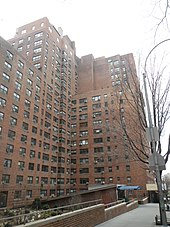Charles M. Schwab House

The Charles M. Schwab House (also called Riverside) was an extravagant, 75 room mansion located on Riverside Drive between West 73rd and West 74th Streets, on the Upper West Side in New York City. It was constructed for steel magnate Charles M. Schwab and was the grandest and most ambitious house ever built on the island of Manhattan. The home was considered by many to be the classic example of a "white elephant", as it was built on the "wrong" side of Central Park away from the more fashionable Upper East Side.[1]
History
The home was designed by an architect with only a modest reputation, Maurice Hébert, as an eclectic Beaux-Arts mixture of pink granite features that made the Vanderbilt mansions on Fifth Avenue look cramped. It combined details from three French Renaissance châteaux: Chenonceau, the exterior staircase from Blois, and Azay-le-Rideau. It took four years to build the home (1902-1906) at a cost of six million dollars.[2]
Schwab's former employer Andrew Carnegie, whose own mansion on upper Fifth Avenue later became the Cooper-Hewitt Museum, once remarked, "Have you seen that place of Charlie's? It makes mine look like a shack."
Schwab was a self-made man who became president of U.S. Steel and later founded Bethlehem Steel Company. Schwab built "Riverside" after leaving Bethlehem, Pennsylvania for New York. The large property was available because it formed half the site of the former New York Orphan Asylum, one of several charitable institutions in the Bloomingdale District that gave way to large projects, such as the Cathedral of Saint John the Divine and Columbia University's campus on Morningside Heights. The Ansonia Hotel now occupies the orphans' Broadway frontage. The financier Jacob Schiff had bought the parcel, but— ominously for the social future of the Upper West Side— Mrs. Schiff refused to move to the "wrong" side of Central Park.
Schwab was a risk-taker and later went bankrupt in the Wall Street Crash of 1929. He died comparatively penniless ten years later in 1939, bequeathing the forlorn 'Riverside" to the City as a suitably ostentatious official residence for the mayors of New York.[3] It is probable that former mayor Jimmie Walker would have moved into the residence, but, unfortunately for the mansion, Fiorello La Guardia, then the mayor, was reform-minded and turned it down, saying "What, me in that?"

La Guardia's rejection of the mansion sealed its fate, and during World War II, a Victory garden was planted in its once-landscaped grounds. Eventually the many dwellings around the home became overcrowded and Riverside Drive lost whatever affluence and wealth that had existed. By 1947 the house was empty and in 1948 it was replaced by a large, red-brick apartment complex, called the "Schwab House."[4]
References
- ^ Upper West Side Story, Peter Salwen
- ^ Kathrens, Michael C. (2005). Great Houses of New York, 1880-1930. New York: Acanthus Press. p. 173. ISBN 978-0-926494-34-3.
{{cite book}}: Cite has empty unknown parameter:|coauthors=(help) - ^ Steel titan: the life of Charles M. Schwab; Hessen, Robert; Pittsburgh, Pa.: University of Pittsburgh Press (1990)
- ^ http://www.emporis.com/building/the-schwab-house-new-york-city-ny-usa
Further reading
- James H. Bridge, The Inside History of the Carnegie Steel Company (1903)
- Ida M. Tarbell, The Life of Elbert H. Gary (1925)
- Arundel Cotter, The Story of Bethlehem Steel (1916) and United States Steel: A Corporation with a Soul (1921)
- Burton J. Hendrick, The Life of Andrew Carnegie (2 vols., 1932; new introduction, 1969)
- Stewart H. Holbrook, Age of the Moguls (1953)
- Joseph Frazier Wall, Andrew Carnegie (1970) and Louis M. Hacker, The World of Andrew Carnegie (1968).
- Burton W. Folsom, Jr., The Myth of the Robber Barons, Young America.
- Hill, Napoleon, Think and Grow Rich (1937)
- John Rothchild, The Bear Book - Survive and Profit in Ferocious Markets (1998). P.250
